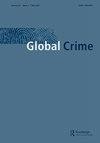Building institutional capacity: knowledge production for transnational security governance in Mexico
IF 1.9
Q2 CRIMINOLOGY & PENOLOGY
引用次数: 0
Abstract
ABSTRACT This article engages with institutionalist knowledge production in US-Mexican security relations, demonstrating how anti-crime governance in the Americas has shifted from a heavy-handed military rationale to a good governance and civil society–centred approach. This shift has been facilitated by the newly emerging resilience discourse which advocates turning local communities from passive beneficiaries of government-sponsored law enforcement into pro-active security partners. It will be argued that the rise of good governance and society-centred policy thinking has enhanced the epistemic authority of a heterogeneous, but ideologically aligned set of human rights advocacy groups, think tanks, policy-oriented academics and for-profit development NGOs – both in Mexico and the United States. This transnational expert community has been instrumental in inserting the issue of drug-related violent crime in Mexico into a globally dominant statebuilding framework. In consequence, security governance in Mexico has taken on a more transnational character and become the object of a highly intrusive international monitoring regime.机构能力建设:墨西哥跨国安全治理的知识生产
摘要本文涉及美墨安全关系中的制度主义知识生产,展示了美洲的反犯罪治理如何从严厉的军事理由转变为以良好治理和公民社会为中心的方法。这一转变得益于新出现的韧性话语,该话语主张将当地社区从政府资助执法的被动受益者转变为积极的安全合作伙伴。有人认为,善政和以社会为中心的政策思维的兴起增强了墨西哥和美国一批异质但意识形态一致的人权倡导团体、智库、政策导向的学者和营利性发展非政府组织的认识权威。这个跨国专家团体在将墨西哥与毒品有关的暴力犯罪问题纳入全球主导的国家建设框架方面发挥了重要作用。因此,墨西哥的安全治理具有更大的跨国性质,成为高度侵入性的国际监测制度的对象。
本文章由计算机程序翻译,如有差异,请以英文原文为准。
求助全文
约1分钟内获得全文
求助全文
来源期刊

Global Crime
CRIMINOLOGY & PENOLOGY-
CiteScore
3.90
自引率
4.50%
发文量
22
期刊介绍:
Global Crime is a social science journal devoted to the study of crime broadly conceived. Its focus is deliberately broad and multi-disciplinary and its first aim is to make the best scholarship on crime available to specialists and non-specialists alike. It endorses no particular orthodoxy and draws on authors from a variety of disciplines, including history, sociology, criminology, economics, political science, anthropology and area studies. The editors welcome contributions on any topic relating to crime, including organized criminality, its history, activities, relations with the state, its penetration of the economy and its perception in popular culture.
 求助内容:
求助内容: 应助结果提醒方式:
应助结果提醒方式:


